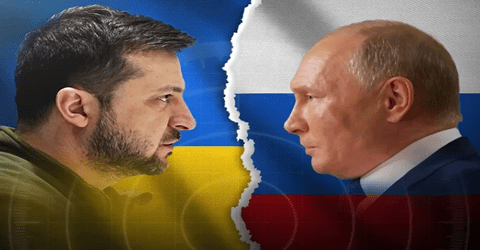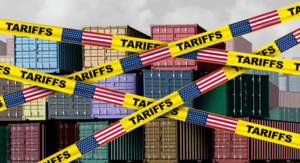
Ukraine War Threatens Russia’s Regional Influence
The Ukraine War threatens Russia and has profoundly impacted global geopolitics, challenging the country’s ambitions of reasserting itself as a dominant regional and global power. President Vladimir Putin’s longstanding strategy to consolidate control over the Black Sea and project power across the Mediterranean and the Middle East now faces significant setbacks.
Russia’s role as a pivotal force in these regions is increasingly undermined, with the war in Ukraine redefining its strategic capabilities and diplomatic reach. This analysis explores the critical areas where the conflict has curtailed Russia’s regional influence and how its geopolitical identity is evolving.
Ukraine War Threatens Russia
The ongoing conflict in Ukraine is undermining Russia’s strategic foothold in the Black Sea, the Mediterranean, and the Middle East. Historically, Russia’s regional influence has hinged on its ability to dominate the Black Sea, enabling seamless naval and military operations across interconnected geopolitical spaces.
However, the Ukraine war threatens Russia by depleting resources, exposing vulnerabilities in its military-industrial complex, and straining its diplomatic relationships. Coupled with the shifting allegiances and priorities of regional actors, this has weakened the Kremlin’s position, signaling a potential decline in Moscow’s regional influence.
Table of Contents
Read More: Impact of the Russia-Ukraine War
1. Russia’s Black Sea Strategy Disrupted
Russia’s dominance in the Black Sea has been a cornerstone of its regional power, but the Ukraine war threatens Russia and has severely disrupted this strategy. Following the annexation of Crimea in 2014, Russia had consolidated control over crucial maritime routes and expanded its influence in the South Caucasus and the Western Balkans.
The ongoing conflict has led to substantial losses for the Russian Black Sea Fleet, with Ukraine disabling or destroying approximately one-third of its warships. Additionally, Turkey’s closure of the Bosphorus and Dardanelles straits to warships has effectively isolated Russia’s naval assets, preventing reinforcements from reaching the Mediterranean. These developments have significantly curtailed Russia’s ability to project power beyond the Black Sea.
Read More: Trump’s Economic Agenda and Challenges
2. Erosion of Naval Power in the Mediterranean
Russia’s Mediterranean strategy, heavily reliant on its Black Sea Fleet, has also suffered due to the Ukraine war. The establishment of the Mediterranean Squadron in 2013 and the subsequent expansion of the Tartus naval base in Syria marked a strategic victory for Moscow.
Yet, the inability to rotate ships between the Black Sea and Mediterranean has weakened Russia’s naval presence. This disruption, underscored by how the Ukraine war threatens Russia, diminishes the Kremlin’s capacity to maintain its influence in the region, challenging its long-term objectives of sustaining a robust military and political presence in the Mediterranean.
Read More: The Impact of Chinese Manufacturing Decline
3. Shifting Dynamics in the Middle East
The war in Ukraine has exposed vulnerabilities in Russia’s influence across the Middle East. Historically, Russia’s military interventions in Syria and Libya demonstrated its ability to exert regional control. However, the Ukraine war threatens Russia by straining its resources and reshaping its approach.
The Kremlin now relies on low-cost, high-impact strategies, such as those employed in Libya, rather than resource-intensive campaigns like in Syria. Additionally, the declining performance of Russian weaponry in Ukraine has tarnished its reputation as a reliable arms supplier, further eroding its leverage over Middle Eastern states.
Read More: Impact of Ukraine Conflict on Russia’s Naval Power in the Black Sea
4. Growing Dependence on Iran
As its regional influence wanes, the Ukraine war threatens Russia, underscoring its dependence on Iran. Iranian drones have played a pivotal role in Russia’s military operations in Ukraine, highlighting Moscow’s increasing reliance on Tehran.
This dependency marks a shift in the balance of power, with Russia’s position in the Middle East becoming less autonomous. The deepening alliance with Iran also complicates Russia’s ability to mediate conflicts in the region, a role it had previously undertaken with initiatives like the Astana meetings and Sochi summits on Syria.
Read More: The Financial Destruction of Palestine
5. Challenges in Balancing Regional Players
The Gaza war has further strained Russia’s regional relationships, particularly with Israel. Historically, Moscow had positioned itself as a mediator capable of balancing conflicting interests in the Middle East. However, the current conflict, coupled with the Ukraine war threatening Russia’s stability and resources, has driven a wedge between Russia and Israel while simultaneously strengthening its ties with Iran and its regional allies. This shift underscores Russia’s declining ability to maintain a neutral and influential stance in regional politics, challenging its claim to great-power status.
Read More: Global Political Instability Signals for Rethinking Political Economics
6. Declining Military-Industrial Complex
Russia’s military-industrial complex, a key pillar of its regional influence, has been significantly weakened by the Ukraine war. The conflict threatens Russia’s ability to maintain its geopolitical stature, as the focus on domestic military needs has limited its capacity to export arms, reducing its strategic leverage over traditional buyers in the Middle East and beyond. Moreover, the poor battlefield performance of Russian weaponry has diminished its appeal, potentially leading to a loss of key markets. This decline undermines Russia’s ability to tether other countries to its strategic interests through arms sales and military cooperation.
Read More: The Rise and Fall of Russia’s Gas Dominance
7. Parallels to Soviet-Era Decline
The current trajectory of Russia’s regional influence bears striking parallels to the Soviet Union’s decline in the Middle East during the Cold War. At its zenith in the early 1970s, Soviet power in the region appeared unassailable. However, the expulsion of Soviet military personnel from Egypt in 1972 marked a turning point, signaling the erosion of Moscow’s influence.
Similarly, Russia’s pre-Ukraine war dominance in the Black Sea and Mediterranean now appears to have peaked, with its subsequent decline accelerated by the ongoing conflict. The Ukraine war threatens Russia’s geopolitical stability, further undermining its regional power and international standing.
Read More: The Economics of War: A Comprehensive Analysis
8. Integrated Strategy for NATO and the EU
As Russia’s influence in the Black Sea and Mediterranean wanes, the ongoing Ukraine war threatens Russia’s strategic position, and NATO and the European Union must adopt an integrated approach to counter Moscow’s ambitions. The interconnected security dynamics of the two regions necessitate a coordinated strategy to ensure stability.
Strengthening NATO’s presence in the Black Sea, alongside bolstering EU partnerships in the Mediterranean, will be crucial in containing Russia’s geopolitical ambitions. This integrated approach will also serve to reinforce the West’s broader strategic objectives in its confrontation with Russia.
Read More: Iran-Israel Conflict: A Major Threat to Middle East Economic Corridor Initiatives
Bottom Line
The Ukraine war threatens Russia and has significantly altered its regional influence, disrupting its dominance in the Black Sea and diminishing its ability to project power in the Mediterranean and Middle East. With its naval power eroded, military-industrial complex weakened, and diplomatic relationships strained, Russia faces a steep decline in its geopolitical standing. As the conflict persists, Moscow’s great-power aspirations appear increasingly out of reach, signaling a shift in the balance of power in these critical regions.





